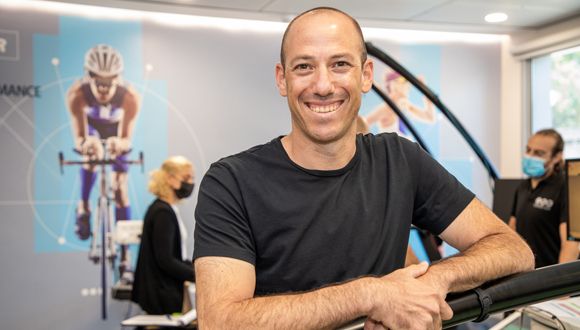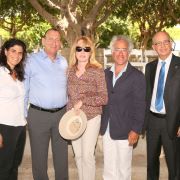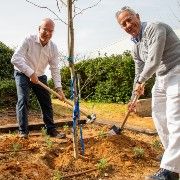Brain Power and Resilience: Israel’s Key to Olympic Gold?
Dr. Yftach Gepner, an expert in exercise physiology from the School of Public Health at TAU’s Sackler Faculty of Medicine and the Sylvan Adams Sports Institute, researches the extent, intensity, and type of exercise needed to improve athletic performance. Ahead of this summer's Tokyo Olympics, he and the Institute’s team prepared several Team Israel members for competition by fine-tuning their capabilities in terms of technique, recovery and nutrition. We spoke to him as Israel sent 89 athletes, its largest Olympic delegation ever, to compete in the Games amid unprecedented pandemic conditions that bar virtually all live spectators.
How will the empty seats and lack of cheering crowds—including families—affect athletes?
There will be a differentiation between varying types of sports. For those that require multitasking, multiple muscle systems and extremely elevated levels of focus and concentration, such as table tennis, the lack of crowds may help. Fans and crowds can adversely influence heartrate, adrenaline concentration and other hormones that affect focus and concentration necessary to utilize minor units of the muscle needed to perfectly perform. Without spectators, some athletes will be calmer and be able to focus better and maintain acute control.
By contrast, athletes can physiologically leverage auditory encouragement to enhance performance in sports that require maximum strength and power for all-out bursts of intensity—like the 200-meter event in running or swimming. Research shows that verbal encouragement can lead to increased muscle strength by 8-10% and rate of force development (or how fast an athlete can develop force) by up to 18%.
Do Israeli athletes have an advantage in the current situation?
Israelis may have increased levels of resilience compared to those from the West like America or European countries; the Olympics require resilience. Exposure to unique conditions such as geopolitical conflict and war could help Israeli athletes deal better with certain types of stress at the Olympics, especially when they are separated from fans and family. Athletes who need to run to bomb shelters a few times during practice are equipped to concentrate and overcome the COVID-related stresses better than their foreign counterparts. As a result, I think we should be very optimistic in terms of medals for Israel.
Israel is sending its biggest Olympic delegation in history to the Tokyo Games. Does this indicate that the country is improving its ability to produce world-class athletes?
The historic Olympic representation indicates a strong step for a country that's not yet flush with resources for such elite-level athletics. Among factors that may contribute to growing success are new institutional drives such as the country’s first Master’s Degree in Exercise Physiology, which TAU launched this past year at the School of Public Health in collaboration with the Sylvan Adams Sport Institute. Along with the Institute, Adams has played a key role in propelling Israeli athletics recently with initiatives such as his Israel Start-Up Nation cycle team. Thanks to measures like these, we can leverage research to bolster athletic capabilities, foster new talent, and improve achievement in worldwide competition. In practice, we can recognize an athlete’s limitations and strengths. With these insights, we can support athletes to achieve their genetic potential with optimal training and recovery. Hopefully, we’ll send an even larger team to the next Olympics.
Members of the Israeli delegation trained at the Sylvan Adams Sports Institute at TAU. How does academia drive athletic progress, particularly for Olympic-level capabilities?
Academic settings provide us scientists with the unique privilege and ability to study subjects in ways that were previously impossible without cutting-edge facilities and technologies. The fact that TAU houses such an Institute specifically focused on enhancing the abilities of Israel's top athletes and nurturing Olympic-level champions is a huge driving force for progress. At the Sylvan Adams Sports Institute, we conduct studies on Olympic-bound athletes to assess practice methods and test factors that affect performance: sleep, duration of performance, duration of rest, nutrition and more. While these are all small pieces separately, together they can provide a full picture of how to improve athletic performance, and bridge that gap of knowledge. In this regard, the Institute serves as a one-stop station for our top athletes.
One of our approaches includes leveraging magnetic resonance imaging (MRI) tools, usually used to scan the brain, to detect changes in muscle integrity (healthy muscles structure) through different modalities of exercise. This is important for Olympic preparation because athletes need to conduct different training activities multiple times a day. With such methods, we can monitor rates of recovery, which have huge effects on athletic performance. For instance, Olympic swimmers—such as TAU medical student and Tokyo contender Andi Murez—compete in several events before the final round; understanding how to recover as quickly as possible can help them succeed.
.jpg)
Andi Murez training at TAU. Credit: Moshe Bedarshi.
What will it take for Israel to become an international athletic powerhouse?
As a nation, it will have to come with increased federal support, better education, and awareness of how sports can boost our development both domestically and internationally, not to mention overall health and productivity. Athletics are a proven mechanism of soft diplomacy for promoting national image by emphasizing traits such as inclusion, diversity, and sports tourism. At a local level, sports foster community bonds and reduce sedentary lifestyles. As such, we should push more kids to be active.
However, change is needed at a national level to improve access to sports by means such as increased funding for athletics in underprivileged areas, periphery communities and for young girls and women. It would even help to expand the types of sports games that can be watched and offer viewing times suitable for all members of families (e.g. not late at night). With top-down backing to spur a great love of sports, we can not only to engage Israelis to be more active but improve our nation’s overall athletic abilities.






